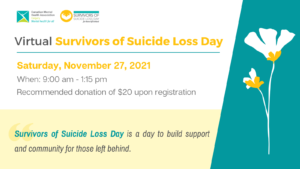How To Build Resilience After Loss
CMHA Calgary counsellor, Mariela, defines resiliency as the process of adapting in the face of adversity. However, adapting to these changes, which in this case refers to life-changing trauma, does have its toll.
“Being resilient doesn’t mean that a person won’t experience difficulties or distress. On the contrary, that person is going to go through emotional states in which they don’t know what to do. People who have suffered major adversity or trauma in their lives, commonly experience emotional pain and stress.”
Although commonly assumed as some sort of characteristic that people are naturally born with, resiliency can be self-taught.
“Resiliency isn’t necessarily a personality trait that some people possess and others don’t. It’s not something that some individuals are gifted with, it’s actually something that we can learn and develop by [implementing] certain behaviours and actions.”
“To build resiliency or to increase someone’s resiliency—it’s like building a muscle. It requires time, it requires intentionality, it requires an effort to to get that muscle strong.” – Mariela
According to Mariela’s research, resiliency has four core components—finding connection, fostering wellness, healthy thinking, and seeking help.¹
- Finding Connection: One-on-one or group connections with those who empathize and can understand how you’re feeling is extremely important, especially in cases of trauma such as a suicide loss. Connecting with these people can ignite loss feelings of purpose and joy.
- Fostering Wellness: Introducing self-care into your life can improve your overall well-being. Whether it’s practicing mindfulness, taking care of your physical health (having a nap, drinking more water, going for a walk), or avoiding harmful substances—putting these into action will extend your resiliency and overall health.
- Healthy Thinking: More than often, when trauma happens in your life, unfiltered, intrusive, and negative thoughts and questions may overwhelm your mind. Mariela says to combat this from happening, you need to train your brain to keep your life in perspective. “In my experience as a practitioner, I tell my clients that it’s very important to embrace healthy thoughts to cultivate hope. It is hard to be positive, but I know when life isn’t going the way you want, you need to maintain that hopeful outlook and not fear what has happened in the past.”
- Seeking Help: Although some people are able to build their resilience on their own, some need more help and guidance. Psychologists and other mental health professionals are able to communicate with their clients to set out individual strategies suited to them. Asking for help is a brave and selfless step that shows progression and courage to get better physically, emotionally and mentally.
Finding Resiliency After Suicide Loss
When someone in your life has suddenly passed by suicide, the amount of emotions that arise is, at some times, too much to comprehend.
“It’s dealing with the death of a loved one, but also an extra layer, which is a traumatic layer. So that person has to deal with two different challenges.”
Another challenge that presents itself is how to engage your resiliency while you’re in the midst of trauma.
Mariela suggests first covering the basics (eating food, sleeping, living in a safe place) and then adjusting to the four core components of resilience, more specifically, seeking professional support and help.
“In such a difficult time, rely on empathetic people that understand the magnitude of the situation and know that you are not alone.”
Survivors of Suicide Loss Day
Coming up on Saturday, November 27, 2021, CMHA Calgary will be hosting our annual Survivors of Suicide Loss Day – a one day event for individuals who have lost someone to suicide (parent, child, spouse/partner, aunt, uncle, cousin, niece, nephew, friend, or extended relationship) to come together and connect in a supportive environment. CMHA Calgary works with a dedicated group of devoted volunteers to present a day of support, healing, information, connection, and hope for those left behind.
For more information or to register for Survivors of Suicide Loss Day, click here.
Mariela has a Master’s in Clinical Psychology and a Bachelor of Arts in Psychology. She has international work experience as a mental health provider in Venezuela and Canada, including mental health, addictions and domestic violence issues.
¹”Building Your Resilience,” American Psychological Association, Last modified February 1, 2020, https://www.apa.org/topics/resilience

Our Peer Support program services can be accessed over the phone at 403-297-1402 or through email at peer@cmha.calgary.ab.ca. We have teamed up with other Calgary agencies to help Calgarians quickly and easily access various counselling and social supports. Visit www.communityconnectyyc.ca, where you can book online for our Suicide Bereavement and Family Support Counselling, and other supports. If you prefer to still book through us, please phone (403-297-1708), or email (counsellingintake@cmha.calgary.ab.ca).
